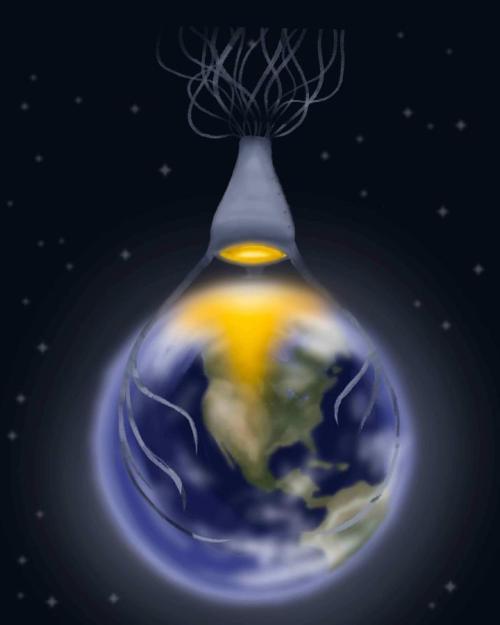Thank you to everyone who submitted to our “Envisioning the Future” contest, part of our Arts Unplugged: Science of the Very, Very Small. Here are our winning entries:
Elementary age group
Winner: Lucca Schwartz
Yes, I believe that tiny technology can and will change our lives. Microscopic technology such as robots can carry a huge amount of information, and share that huge amount of information with other microscopic technologies at super fast speeds. Robots affect our everyday lives, even if we do not notice. They are more powerful and smart than us humans think. Some people say that robots will take over the world someday. This shows that robots are very powerful, sometimes more powerful than human beings.
High School age group
Visual winner: Avalon Golden
Avalon's image depicts how nanotechnology will help create a carbon free atmosphere:
Writing winner: Sophia Schumaecker
Microscopic entities have been revolutionizing the fields encompassing the applied research sciences for decades, with nanomaterials emerging at the forefront of much technological innovation. Although they have been utilized for applications ranging from genetic vectors to water filtration, I believe that these machines truly have an important role to play in the future of the biomedical treatment of degenerative diseases, a class of conditions which impair millions across the globe. Biocompatible microscopic robots could be engineered to bio sense for regions of these diseases through detection of certain stress signals, and then consequently bind to these regions. Afterwards, internal treatment delivery to these regions could be triggered through this binding, whether it be reconstruction of diminished sights using nanoscale-tissue scaffolding or release of certain chemicals to trigger regenerative signaling pathways. Through such methods not only is the vast versatility and precision of these microscopic robots discovered, but also its effectiveness in treating some of the most detrimental disorders impacting our current world, including ALS, arthritis, osteoporosis, etc.
Adult age group
Winner: Vinh Truong
Our exploration of the very, very small has guaranteed us one thing, that we are no longer afraid of the very, very small. In the past, we let nature handle all of the small, hoping that evolution over millions of years would be able to perfect itself. Unfortunately, we don’t have the time to wait, as problems challenging human health and the world are forcing an immediate response.
Luckily, the scientists of today are helping us curate this reply. Advances in CRISPR herald a world where we are able to compete with nature on even footing. Genetic diseases will become a thing of the past, along with world hunger as we develop climate-resilient and disease-resistant crops. Robots on the nanoscale level will aid these efforts, giving us control of the “wild, wild” microscopic landscape populated by DNA and proteins. By getting rid of health and food problems that seemed hopeless in the past, we welcome a world where everyone is given an equal opportunity at life.
While our future seems to be focused on the very, very small, I think it’s also safe to say that it is also very, very bright.
